The scarcity of certain foods in early Nebraska encouraged the use of substitutes. Coffee, for example, was sometimes replaced or extended with such foods as dried barley, rye, and corn. The Nebraska Farmer of March 1862 included several letters from readers suggesting others: dried carrots and okra seeds.
H. A. Terry of Crescent City, Iowa, wrote: “During these [Civil] War times, when real coffee is worth 25 to 33 cts. per pound, it is necessary for farmers, and farmers wives to cast about for a cheaper substitute for the real article; and from my own experience, I can recommend the following:
“Carrots.-These are prepared and used as follows: Wash and slice across in pieces a half inch thick, and dry in the sun or stove oven, so as to not cook them. When dry, brown and use the same as coffee. Prepared in this manner, equal parts of carrots and coffee is an excellent substitute for the genuine Rio.
“Okra or Gumbo.-This makes the best coffee of any article that I have ever used as a substitute for coffee. The seed should be browned the same as coffee and makes a very palatable drink alone but is a little better if a little coffee is used with it. The plant is very productive and is easily grown. An ounce of the seed will produce enough for almost any family. The seed can be procured of any seedsman for 25 to 30 cents per ounce.”
James R. Knapp of Scott County, Illinois, sent Robert W. Furnas, editor of the Nebraska Farmer, some okra seed and wrote: “On account of these hard times, and the high price of coffee, I, as well as my neighbors, have been compelled to resort to substitutes. I happened, by chance, to come across some Gumbo or Okra seed, which my neighbor had raised in his garden merely as an ornamental plant. I remembered seeing in a newspaper some seven or eight years before, that Okra or Gumbo possessed the properties of coffee; so I obtained a few seeds to try it, though with little faith. I found it better than I had expected. I never could have told the difference by the taste or effect. I consider it as good a substitute for coffee, as Sorghum is for molasses, and as easy raised as beans.
“Okra is a large strong growing stalk, much like the castor bean. The seed grows in a pod or bowl four or five inches long, and about one inch thick, and resembles the May pea, but some smaller. It grows in seams up the side of the pod, which open as it ripens. It ripens from the ground up, like the castor bean. It should be planted as early as possible to miss the spring frost, as it bears until frost in the Fall. Prepared the same as coffee.”

This Solomon D. Butcher photo depicts a bachelor preparing supper in 1886 with the coffee pot a prominent part of his tableware. NSHS RG2608-2401



